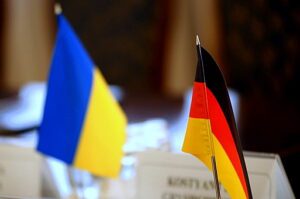
President of Ukraine Volodymyr Zelensky has arrived on a two-day working visit to Germany.
According to the presidential press service, Zelensky will hold a number of meetings, in particular with Federal President Frank-Walter Steinmeier and German Chancellor Angela Merkel.
A meeting is also planned with Head of the Christian Democratic Union, Minister-President of North Rhine-Westphalia Armin Laschet.
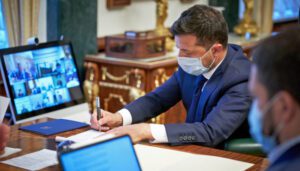
President of Ukraine Volodymyr Zelensky by decree No. 264 has put into effect the decision of the National Security and Defense Council (NSDC) of June 18 on the extension and introduction of new sanctions against 55 Russian banks, payment systems and the so-called “central banks” from ORDLO at the suggestion of the National Bank of Ukraine.
According to the document posted on the website of the head of state, this list still includes, in particular, Bank of Moscow, Gazprom Bank, Bank Rossiya, Bank VTB, State Corporation VEB.RF, Sberbank Russia, as well as payment systems MoneyTo, BLIZKO, ANELIK, Kolibri.
With regard to banks that have subsidiaries in Ukraine, the restriction is to prevent the withdrawal of capital from the country.
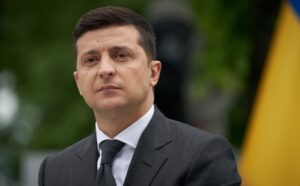
President of Ukraine Volodymyr Zelensky appointed by his decrees the Ambassadors of Ukraine to Ireland, the Principality of Monaco and Senegal.
Relevant decrees No. 177/2021, No. 178/2021, No. 179/2021 dated April 28, 2021 are released on the presidential website.
Thus, Ambassador of Ukraine to the French Republic Vadym Omelchenko was appointed as Ambassador of Ukraine to the Principality of Monaco concurrently.
Larysa Anatoliyivna Herasko was appointed as Ambassador of Ukraine to Ireland; Yuriy Anatoliyovych Pyvovarov was appointed as Ambassador of Ukraine to the Republic of Senegal.
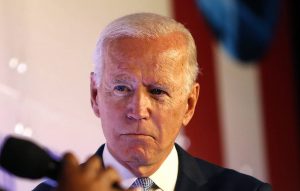
Charge d’Affaires of the United States in Ukraine Kristina Kvien expressed confidence that a telephone conversation between U.S. President Joe Biden and Ukrainian President Volodymyr Zelensky will take place.
“Secretary Blinken’s remarks confirm that Ukraine will be a high priority for the administration and there’s no doubt that a call between President Biden and President Zelensky will happen,” Kvien said in an interview with Interfax-Ukraine.
In turn, Deputy Political Counselor Lynette Behnke pointed out that the U.S. Embassy in Ukraine hopes that both presidents will be able to talk directly, that it is essential to recall that, nevertheless, much has been achieved at other levels, somewhat below the level of the leaders of the countries.
“In early February, very early in this administration, Secretary Blinken spoke to his counterpart, Foreign Minister Kuleba. Defense Minister Taran has spoken with Defense Secretary Austin. Head of the Presidential Office Yermak spoke to National Security Advisor Sullivan. Other senior officials will connect in the near future. And every day at Embassy Kyiv we are working together with our Ukrainian counterparts on our common priorities,” she explained.
Behnke noted that both the White House and Secretary of State Blinken have repeatedly stressed the United States’ commitment to supporting Ukraine’s sovereignty and territorial integrity.
“The Secretary made a very strong statement supporting Ukraine on the 7th anniversary of the purported annexation of Crimea. He made a special video to underline his personal commitment. The Biden administration has wholeheartedly welcomed Ukraine’s Crimean Platform initiative,” she added.
“Meanwhile, our security and development assistance continues unabated. To give a concrete example, we announced another tranche of $125 million in security assistance on March 5,” Behnke said.
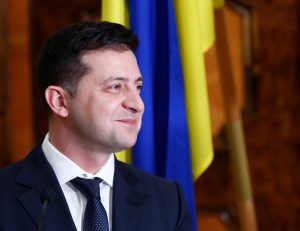
U.S. President Joe Biden should establish direct and trusting relations with Ukrainian President Volodymyr Zelensky in order to return to normal relations between the countries, experts say.
This recommendation is contained in the “Biden and Ukraine” strategy developed for the administration of new U.S. President Joe Biden, which was released on Friday.
The authors of the work are former NATO Deputy Secretary General Alexander Vershbow, former Ambassadors to Ukraine John Herbst and William Taylor, chief analyst of the Eurasian Center of the Atlantic Council Anders Aslund, former Assistant Secretary of State for Europe and Eurasia Daniel Fried and Deputy Director of the Eurasian Center of the Atlantic Council Melinda Haring.
“The first order of business should be to establish straightforward relationship, a relationship of trust between Biden and Zelensky after efforts by Trump to leverage the United States’ relationship with Ukraine for his own political benefit. Despite Trump’s actions and the subsequent impeachment process, the United States continued to provide bipartisan support for Ukraine, which testifies to its important interests there and the wisdom of congressional leaders. Still, this experience has left the Zelensky team with real concerns about its relationship with Washington and its image among the U.S. public,” the experts said in the document.
The authors believe that a return to normal the U.S.-Ukrainian relations “will inevitably take time” as the new administrative staff its senior foreign policy ranks.
According to the recommendations, U.S. Secretary of State Antony Blinken has already called Foreign Minister of Ukraine Dmytro Kuleba and “it is important that Biden, U.S. Vice President Kamala Harris and U.S. National Security Advisor Jake Sullivan be in touch soon with their Ukrainian counterparts to underscore the administration’s commitment to cooperate closely with Ukraine.”
“The big objectives of the U.S. policy have been the same since 2014: to help Ukraine defend its territorial integrity and sovereignty in the face of Kremlin aggression, and to help Ukraine undertake the reforms needed to become a nation of laws with a growing and prosperous economy. The Biden team is uniquely qualified to pursue these objectives successfully,” the analysts said.
In addition, they said that vice president, Biden was a hands-on policy maker for Ukraine.
“Now, as president, he will not have the time for that, but he should reach out to Zelensky, first by phone Ukraine’s President Volodymyr Zelensky, German Chancellor Angela Merkel, French President Emmanuel Macron and Russia’s President Vladimir Putin attend a joint news conference after a Normandy-format summit in Paris, France, December 9, 2019. Establishing a president-to-president understanding will facilitate policy dealings at lower levels and increase US clout in Kyiv, which will prove important as it works with Ukraine on difficult reform issues,” according to the recommendations.
In their opinion, it is necessary to appoint an ambassador to Ukraine as soon as possible and work with Congress to increase military assistance to Kyiv in the amount of up to $500 million per year.
“Appoint an ambassador as soon as possible. Quickly name a strong candidate who has Biden and Blinken’s trust as the new U.S. ambassador to Ukraine and work for their quick Senate confirmation and dispatch to Ukraine,” the experts said in the document.
“Name a special envoy or empower a senior subcabinet official to either join the Normandy Format or to consult frequently with the four players,” the authors said.